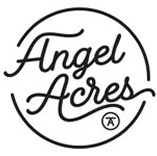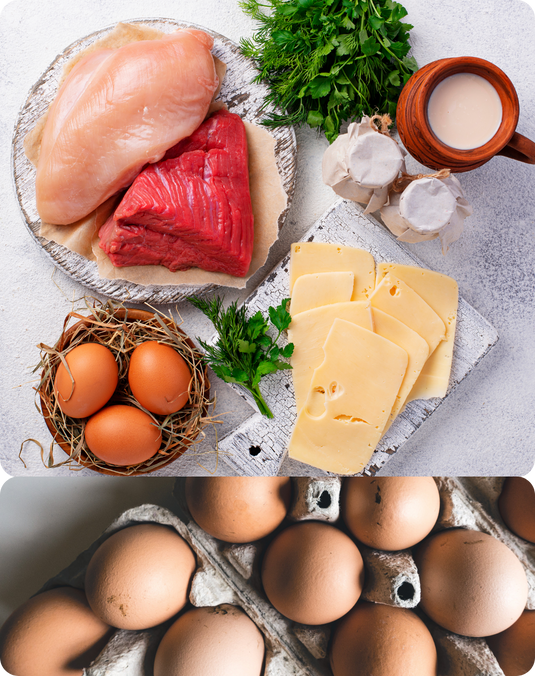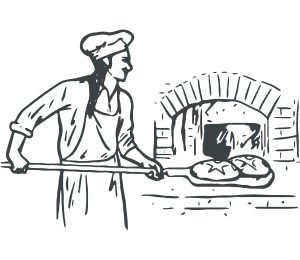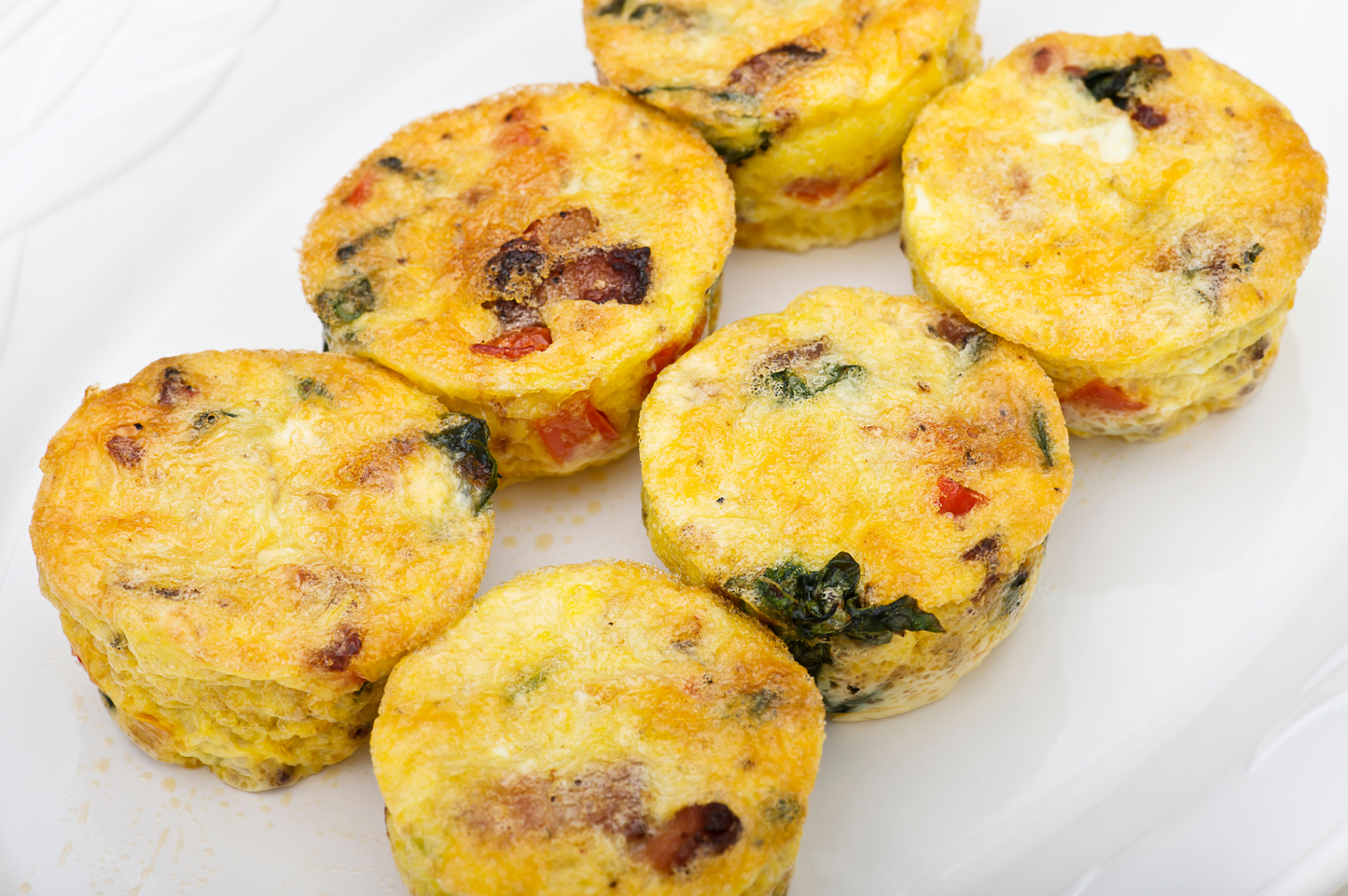
us vs them
The Ladies Are Fed a Custom-Made Feed
We are first-generation female farmers who came into farming with a focus on human health. Our mission was simple: to produce the healthiest eggs we could find.
That meant raising our chickens outside in mobile coops for natural foraging and fresh air. But even pasture-raised chickens rely on supplemental feed for 70–90% of their diet, and what they eat matters!
None of the available feed options met our standards. Even the so-called “corn and soy free” feeds were often packed with other high-PUFA ingredients like sunflower, safflower, canola, flax, or vegetable oils, which just increase PUFAs in the final egg and defeat the purpose.
Instead of settling for typical chicken feed, we chose to make our own. After years of research, testing, and refining, we developed a custom feed that truly improves the fatty acid profile of our eggs! (74% less Linoleic Acid, an Omega 6 PUFA)
the angel acres difference

low pufa, healthy fats
Linoleic acid (LA), an omega-6 polyunsaturated fat (PUFA) abundant in seed oils, is known to lower metabolic rate and negatively impact overall health. Unfortunately, modern eggs are also high in this PUFA fat! PUFAs in = PUFAs out. Meaning, chickens who eat more PUFAs (like soy, corn byproducts, etc.) lay eggs with higher PUFA levels.
While pasture-raised eggs are often seen as healthier, many pasture-raised hens still receive PUFA-rich supplemental feed containing corn, soy, or other vegetable oil byproducts. These feeds drive up the levels of Omega-6 fats in the final egg, which interfere with your metabolism.
At Angel Acres, we’ve chosen a different path, creating our own feed that’s free of corn, soy, seed oils, and other high-PUFA ingredients, so our eggs deliver the cleanest, healthiest fats for your body.
Our eggs are lab-tested to contain 74% less LA compared to other pasture-raised eggs. By keeping your LA intake at more biologically appropriate levels, our eggs support lower inflammation, less cellular damage, and better metabolic function.
We are committed to providing the healthiest egg you can find, which requires custom formulating our own feed.
Hormonally-balanced
Lab-tested to have virtually no detectable phytoestrogens - plant compounds that can mimic estrogen in the body. When chickens eat soy or flax, phytoestrogens build up in their eggs, ending up on your plate. Phytoestrogens are known endocrine disruptors linked to estrogen dominance, negatively affecting thyroid and hormone health.
Our feed is low in phytoestrogens, producing hormonally balanced eggs. (Lab tested to contain virtually no phytoestrogens, and significantly less relative to pasture raised eggs when chickens are fed soy or flax)
Learn more about phytoestrogens here.
Allergen friendly
We have many egg club members who are allergic to other eggs, but can eat our eggs with no problems! Food allergens are passed through to the egg so with our custom made feed free of corn and soy, our eggs are tolerated by many individuals! Many people don't have problems with eggs, but instead how modern eggs are produced and what chickens eat.
Regenerative & Sustainable
Our ladies are moved out on pasture using mobile coops so that they have access to fresh pasture, fresh bugs, and clean living conditions. This model of farming (mobile pasture-raised) spreads out animal impact and allows for the land to rest, improving soil health and regenerating landscapes, creating a healthier environment for us all!
seed to fork
Not only do we craft our own custom, corn and soy-free, low PUFA feed for our chickens, but we also know where the ingredients come from and who produces them, ensuring no toxic pesticides show up in the eggs you consume (lab tested to be free of glyphosate!)
We have egg farm partners. But we also partner with regenerative row crop farmers who share our commitment to rebuilding soil health through sustainable practices. This ensures that our feed ingredients are grown without toxic pesticides, and we have full oversight of every step in the process.
Unlike many farms that rely on pre-made organic or conventional feeds from unknown sources, we maintain complete control over our feed, ensuring it’s as pure and wholesome as the meat and eggs we produce.
Our commitment to quality is proven through recent laboratory testing, which confirmed that our eggs are completely free of glyphosate residue: a testament to the care and attention we put into sourcing and growing our feed. This is just one example of how our partnerships with regenerative farmers go beyond the conventional standards of organic certification. We don’t just trust labels; we know our farmers personally, ensuring their practices align with our mission to protect the environment and provide you with the cleanest, most nutrient-dense food possible.
drug free
Regular moves in mobile chicken coops provides healthy living conditions where the hens aren't exposed to their waste, plus access to fresh air, sunshine and clean air. When you work with Mother Nature, pharmaceuticals (which are common in chicken barns) are not needed. Our farmers do not use vaccines, antibiotics or hormones.

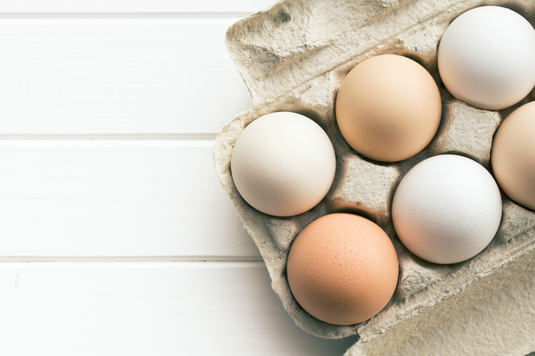
Glyophosate free!
Third-party testing confirms our eggs are glyphosate-free, reflecting our commitment
to regenerative farming and toxin-free food.
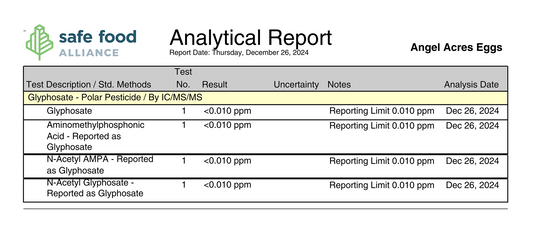

What is 'mobile pasture-raised'?
It's a return to old-fashioned farming, but the future of ethical, nutrient-dense food.
At Angel Acres Egg Club, our hens live outdoors in mobile coops that move regularly to fresh pasture. No standing in waste, no harsh cleaners, no cramped barns. Just clean chemical-free pastures, fresh air, and natural sunlight.
With these leaving conditions our chickens get to be chickens: scratching, pecking, sunbathing, and feasting on bugs and wild greens.
The result? Healthier hens and deeply nourishing eggs, rich in vitamins, minerals, polyphenols, and real flavor.
This system takes more work (moving coops, feeders, and water) but it’s worth it. It’s better for the chickens, better for the land, and better for you. 🌱
Because when we care for the land and the animal, it shows up in the food.
Frequently Asked Questions
Why are your eggs so expensive?
The higher cost of our eggs is primarily due to the specialized packaging required for delivery of the premium eggs, and the FedEx shipping fee adds to the overall costs. (A lot more than $0.10 cartons at the store!) The cost also includes shipping protection, so that damaged or stolen boxes are fully covered.
Additionally, we have developed a custom, one-of-a-kind chicken feed that does not contain any corn, soy, or other high-PUFA ingredients that are often subsidized and therefore cheaper to acquire. Our feed costs are 3-5 times higher than standard chicken feeds.
We are diligently working to bring our costs down so we can transfer this reduced fee to the customer, without cutting any corners.
What does corn- and soy- free eggs mean?
All chickens (even pasture-raised ones) require supplemental feed, which can make up 70–90% of their diet. What they eat has a huge impact on the quality of the eggs they produce.
Corn and soy free means that the feed does not contain corn or soy. Typical commercial chicken feeds, even for pasture-raised hens, often include soybean meal, soy oil, “vegetable oil,” and corn-based ingredients like dried distillers grains. These ingredients are highly unsaturated and loaded with plant-based polyunsaturated fats (PUFAs), especially omega-6 linoleic acid (LA).
Here’s the key point: when a chicken eats more PUFAs, more PUFAs show up in her eggs. That’s a problem because most of us are already overexposed to these unstable fats from vegetable oils and conventional meats, something our ancestors never dealt with in such high quantities.
Unfortunately, many brands advertising “corn and soy free” eggs stop at removing corn and soy... but what do they replace them with?
Often, the substitutes are other high-PUFA seeds and oils, which doesn’t solve the PUFA problem... it just repackages it.
At Nourish and Angel Acres Egg Club we do things differently. We custom formulate our feed to be corn- and soy-free and low in PUFAs, producing eggs with 74% less linoleic acid than conventional eggs.
When done the right way, corn and soy free eggs can lead to:
- Less unstable fats in your diet
- Lower oxidation and free radical formation
- Fewer hormone-disrupting compounds
- Eggs that are easier to digest
When done right, “corn and soy free” isn’t just an allergen label, it’s a way to restore eggs to the nutrient profile nature intended.
Want to dig deeper? Check out my YouTube video where I explore “Is Corn- and Soy-Free a Scam?”
> Tune in here
Are your eggs Organic?
No, and for a reason! It’s time we stop blindly trusting this Organic label, and dig in deeper!
Instead of relying on generic labels, we partner directly with regenerative row crop farmers who do not use harmful chemicals. This allows us to know exactly where and how every ingredient in our custom Low-PUFA feed blend is grown.
From seed to feed, feed to chicken, chicken to egg, and egg to fork, we oversee every step of the process. This hands-on approach ensures our eggs meet the highest standards of quality, health, and transparency.
Since we know where the feed ingredients are grown, and the chickens forage and flourish on chemical free pastures recent lab tests have confirmed that Angel Acres eggs are free of glyphosate. This isn’t just luck... it’s by design.
At Angel Acres, we believe you deserve food grown with integrity and care. That’s why we take the time to know our farmers, their practices, and the land they nurture—so you can feel confident in every bite.
Organic eggs just mean that the chickens were fed ‘certified organic feed ingredients’ - but they can still be stuffed into confinement barns. And I hate to break it to you, but Organic Soy Beans contain the same amount of PUFAs as non organic soybeans. Our fatty acid tests confirm that our eggs contain 74% less Linoleic Acid (an Omega 6 PUFA relative to a popular ‘Organic Pasture Raised Egg’).
Another issue is that the organic feed used for laying hens is heavily imported (over 80%), particularly soy and corn from India, Turkey, and South America.
This "Organic Feed" being imported with unknown, hard to regulate standards may be why organic eggs have tested positive for glyphosate residues in multiple studies. A report found that a sample of organic cage-free eggs contained glyphosate residue levels of 169 parts per billion (ppb), which is above the allowable tolerance level of 50ppb. [ref] Another study detected 0.76 mg/kg of glyphosate residue in eggs, which is higher than previously reported levels. [ref]
Our eggs, on the other hand, have officially tested glyphosate-free, which is the result of our high quality, custom made feed from our regenerative row crop farmers, and zero spray policy on our small regenerative farms. See results below!

Why do you have partner farms?
We believe in small regenerative farms—not factory farms or confinement operations. To expand our supply without compromising our standards, we partner with like-minded small-scale farms that follow the same regenerative practices (mobile pasture-raised) and feed standards. Allpartner farms use our custom low PUFA feed blend and zero pesticides or chemicals on pasture to ensure consistency and quality across the board. Here’s a video of me visiting our Kansas hub so you can see firsthand how we uphold these values at every level of production!
Are your eggs 100% grass-fed?
The reality is that there are no 100% grass-fed chickens since chickens are omnivores, not vegetarians.
Chickens are monogastric (single stomached) animals (like us), meaning they cannot get their required protein intake from grass alone (unlike ruminants such as cows). So while our chickens consume grass and bugs on pasture, they are supplemented with our custom-made feed (in addition to beef meat scraps, organs, and produce compost).
What does pasture-raised mean for eggs?
Unfortunately, the term pasture-raised is not regulated. So this most likely means chickens live inside a barn and have access to a small door and a single pasture 365 days out of the year (which gets degraded with overuse). So the chickens diet is mostly grain-based, which is often high in PUFA rich ingredients like corn, soy and distiller grains.
We have higher standards - our chickens are ‘mobile pasture-raised’ where their coops are mobile and they are regularly moved to a fresh patch of grass.
Eggs from truly pasture-raised chickens contain significantly more nutrients since the chicken’s diet directly affects the level of nutrients in the eggs. Hens on pasture have access to all kinds of things not available to chickens in a cage - like sunlight (for more Vitamin D synthesis!), grass, bugs, and the occasional field mouse! (Since chickens are not vegetarians - please don’t fall for that scam marketing label at the store!)
How long do your eggs last?
Our unwashed eggs actually have a much longer shelf life than you may expect. Since we leave the protective "bloom" layer intact, our eggs can last up to 2 months or more in the refrigerator, but we cannot guarantee a specific shelf life. Generally, unwashed eggs can last 4-6 weeks when stored at room temperature in a cool environment. We recommend refrigerating the eggs upon arrival for the best result and longest shelf life.
What's the difference between cage-free, free-range, & pasture-raised?
The egg industry doesn’t want you to know this... but your eggs could be from hens that never touched real grass.
Caged birds live in cramped, unnatural conditions. No sunlight. No space. Just a diet of pesticide-heavy feed.
Cage-free sounds better, but those birds still live indoors their entire lives (just not in cages).
And free-range? Often just a tiny door to a small outdoor area they might never even reach.
Even pasture-raised labels can be misleading. If the big barn never moves, the land gets worn down, the hens stay in the same environment, and their diet is still mostly feed.
At Angel Acres Egg Club, we go further. Our hens are mobile pasture-raised on regenerative land.
Their coops are moved to fresh pasture every few days so they can forage on diverse grasses and insects, stay healthy without pharmaceuticals, and lay nutrient-rich eggs you can feel good about feeding your family. Because when the hens thrive, so do you.
Plus, in this regenerative mobile pasture-raised model, the chickens are helping to restore soil health, create thriving ecosystems, and build a healthier environment for generations to come. Eggs you can feel good about, too!
What does low PUFA mean?
All fats are not created equal. There are three main types: polyunsaturated fats (PUFAs), monounsaturated fats (MUFAs), and saturated fats (SFAs). You’ve probably heard about seed oils... they’re high in PUFAs, which is why they can disrupt metabolism and wreak havoc inside the body. Unfortunately, many modern eggs can be similar, because standard chicken feed is loaded with PUFA-rich ingredients.
So why does this matter?
The types of fat in an egg come directly from what the hen eats (even pasture-raised hens, since feed still makes up 70–90% of their diet).
The fats we eat don’t just provide energy; they become part of our cells and act as powerful metabolic signals. Too many PUFAs can:
- - Impair energy production
- - Increase oxidative stress
- - Disrupt insulin sensitivity
- - Alter fat composition
- - Slow metabolism
- - Raise inflammation and chronic disease risk
A century ago, PUFAs made up just 1–2% of our calories. Today, they’re 15–25% thanks to changes in our food system (and the diet of livestock like chickens). Conventional feed these days leads to eggs with elevated PUFA levels.
That’s why we make our own custom low-PUFA feed, free of corn, soy, flax, and other high-PUFA ingredients. The result? Eggs that are genuinely nourishing, with fewer unstable fats and a healthier fatty acid profile.
Want to dive deeper into the health consequences of PUFAs? Check out our [blog post] or watch our [YouTube video]!

